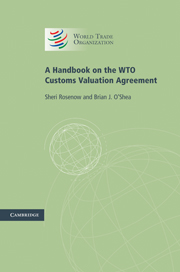6 - Conclusion
Published online by Cambridge University Press: 05 March 2012
Summary
The WTO Valuation Agreement is fifteen years old at the time of writing. It is applied by the 153 WTO Members, representing all levels of economic development, to the full variety of their import trade transactions. If one takes into account the predecessor GATT Valuation Code, these valuation rules have been in use in international practice for over thirty years. What then do WTO Members think of the Agreement? What are its major failings, if there are any, and what improvements can be made? What is the future for common customs valuation rules?
A DEVELOPING–DEVELOPED COUNTRY DIVIDE?
Perhaps the main doubt about the WTO customs valuation system, which has been present from the time of the negotiation of the Tokyo Round Code in the late 1970s, is whether it adequately accommodates the needs of the developing and least-developed countries. As described in previous chapters, the main changes that have been made to the Agreement or its predecessor GATT Valuation Code were originated by developing countries, and were driven by a concern that the Agreement did not give these countries sufficient tools to protect themselves against importer fraud, which affects developing countries disproportionately because of their typically higher duty rates and greater dependency on customs for government revenue. Thus, in the Tokyo Round negotiations, developing countries successfully included the Protocol to the Agreement on Implementation of Article VII, to allow the use of minimum price systems to continue for a transition period, among other protections. In the Uruguay Round negotiations, Members agreed to the Decision Regarding Cases Where Customs Administrations Have Reasons to Doubt the Truth or Accuracy of the Declared Value to clarify the balance of proof between customs and the importer, where fraud is suspected. And in more recent years, developing countries have proposed various changes to the Agreement to deal with fraud, such as binding rules for the exchange of information between national customs authorities to validate an importer’s declared value.
- Type
- Chapter
- Information
- A Handbook on the WTO Customs Valuation Agreement , pp. 170 - 176Publisher: Cambridge University PressPrint publication year: 2010



